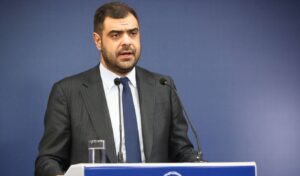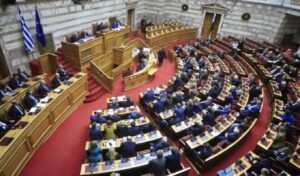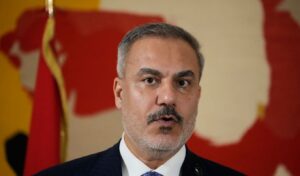Former Prime Minister Alexis Tsipras gave an extensive interview to Efimerida ton Syntakton, where he speaks openly about his new phase after leaving Parliament, unfolds his political and personal stance, and describes his motives and intentions for the future. He also reveals that his new book will soon be presented, which he characterizes as a “debt to History,” as he attempts to present his own version of the 2015-2019 period, illuminate unknown aspects, and counter what he calls the “distortion of truth.”
He analyzes the reasons for his resignation, speaking of “personal and political suffocation” within a paralyzed political system and an opposition that doesn’t seek breakthroughs. He explains that he chooses to “go out to society” freed from offices and mechanisms while simultaneously positioning himself on institutional pathologies, corruption, Justice, taxation, and the need for a new progressive plan, while leaving clear barbs for today’s political scene and the Right. Finally, he talks about the next day, rejecting ready-made schemes and emphasizing that change can only come “from below.”
“Be patient. In a few days, the book’s title will be announced by the publishing house that undertook its publication,” says the former Prime Minister regarding his upcoming book. He emphasizes that besides being a “debt to History,” it is also “a personal need to speak about everything that happened, small and large, in a difficult political journey, about which almost everyone has spoken except me, who was the protagonist. To illuminate all aspects of the dramatic period 2015-2019, known, lesser known, and unknown. And to respond with facts, evidence, documents, to the unprecedented abuse, distortion, and murder of truth, which continues to this day, for a critical period of our homeland. With those guilty for the darkness of bankruptcy appearing as accusers of those who took responsibility to secure the future.
The book is also a debt to the citizens. With the crisis, lives were destroyed or devalued, living standards fell dramatically, professional horizons closed, families paid a heavy price. We owe it to speak to them. To tell the truth. About our choices too. And self-critically when needed. To tell the truth about the choices of people from the old system. You know, those failures who still give lessons today.”
So your book concerns the difficult recent past?
Of course not, let me finish. Condensing the experience of the past, I attempt through its pages to answer critical questions of today. Where is the country heading? What important opportunities has it lost? How can hope survive when society is besieged by a regime of injustice, corruption, demolition of the rule of law, cover-up, lies, and deception? What should we do as a society and as a country to escape the siege situation and open a path of justice and progress? Therefore, the book is my own testimony for yesterday, but at the same time, quite consciously, it is permeated by my concerns, thoughts, proposals, my vision, if I may say so, for today and tomorrow.
Let’s now go to the big issue that concerns parties, the political system, current affairs? What was that decisive event that pushed you to resign from your parliamentary position?
There was no decisive event. There was the personal and political suffocation that the government’s systemic practices caused me, as they did to millions of Greeks, every day, increasingly painfully I would say. And the apparent inability of democratic opposition to open a path of democratic escape. The paralysis of institutions, of Justice, of Parliament itself with its current correlations, created a sense of political suffocation within it. And it prompted me to dedicate whatever political capital the citizens gave me, not to maintaining the privileges of a member of parliament, but to the effort to reverse the course of society’s disappointment and democracy’s decay.
It’s an unconventional initiative with moral motives. I wanted above all to feel good about myself, with my conscience. I didn’t want to enjoy privileges anymore when I felt I had no ability to meet the expectations of those who trusted me. But also political motives. I decided to free myself from commitments, offices, and mechanisms. To step outside the political system that, in my opinion, as it stands, can no longer give anything to society and the homeland. A flight forward, to use Yannis Skarimbas’ expression. Toward society, citizens, those who refuse with fighting terms or even with terms of silent disapproval to conform to today’s reality.
You repeat what you say in your resignation statement, that you suffocate in today’s political system and today’s Parliament. Are there no margins for progressive opposition to exercise its role and duties?
No. There aren’t. At least those it shows reconciled with today’s rot and doesn’t risk breakthroughs. This is the opinion I formed through agonizing reflection, based on experience, developments after the last elections, but also the values I want to serve. This is also the reason that led me to say no to the professional politician’s security and meet with the citizen’s insecurity, although I know that no politician can fully feel the citizen’s insecurity.
And what, in your opinion, should be done? If you were in a position of responsibility again, what changes to the political system would you bring?
I believe our homeland needs a big, decisive shock, which I would call a shock of honesty, justice, and democracy. To reconnect politics with ethics and the political system with citizens. It needs a big leap forward: institutional, economic, social. It needs a new pride, not in the nationalist sense of the term, but the pride of self-respect, the joy of living in a just, creative country that cares for those left behind, that has a vision for the future.
I recently spoke about the need for a new patriotism regarding taxation of great wealth. I believe that a new patriotism, which transcends easy ideological divisions, is needed today more than ever since the post-dictatorship era, in all fields of social and political action.
Corruption, manipulation of Justice, paralysis of institutions, provocative support of great wealth at the expense of the social majority, weakening of the country’s international position, governance with terms of personal enrichment, require the awakening and mobilization of the many, who see their lives and their tomorrow being sold off for the benefit of the few.
And of course, they require the reorganization and reconstitution of progressive opposition, which in its current fragmented and unreliable form cannot play the role that the Constitution defines and society needs. We are among the last in Europe in labor compensation and among the first in taxing it. Champions in low dividend taxation, in information manipulation, in rule of law decline, in incompetence and corruption that cost human lives. All this must change. I say therefore that it can’t go on with a government that has built a corruption regime and with a prime minister who operates as an oligarch.
If this is how things are, do you think it would be a solution for other MPs to resign too?
I will not dictate to anyone what only their conscience decides. And let me clarify here that I chose in full consciousness the path outside the system, within society, without any agreement with anyone. And I have no intention of reproducing recruitment or split tactics, which only manage to intensify society’s disappointment.
I mean, in short, what I said in my resignation statement: I feel the need to speak with citizens, to listen to them, to walk with them on the path we will open together. The self-sufficiency and self-satisfaction of some self-appointed Messiah, who recruits his students, is the last thing our homeland and society need today. Only the action of the many can become the engine of a journey toward progress, outside today’s toxic swamp. I want to dedicate my energy to this.
You give us the opportunity to ask you here: How does a politician, experienced moreover, come down to the people to listen to them, as you say, in an era when politicians are not particularly popular with the social whole?
Politicians aren’t popular because they increasingly resemble each other. Because they don’t convince that they care more about collective vision and common good than their personal interest and re-election. You know what a student I met at the Sorbonne with origins from Edessa told me? “I can no longer distinguish the left from the right MP. They do the same things. They speak almost the same way, even if they say different words.”
This observation of hers troubled and saddened me, because she’s not alone. Many of our fellow citizens share similar thoughts. If then we don’t change ourselves, if we don’t make a difference primarily ethically, in values, culturally, how will we convince that we are something different? How will we change the world if we appear comfortable with today’s situation?
Aristotle taught us that Reason alone, that is arguments, is not enough. You also need Ethos, that is who you are and what you do, you who speak, if you want to persuade.
Does the renewal of the political scene, which you refer to, concern the space of Left and Center-Left or does it only have to do with governmental alternation?
Obviously it concerns the entire political system, which has now lost the trust of the vast majority. But it mainly concerns the Left, the progressive camp. I believe the time has come -we’ve actually delayed- for a big, bold, decisive renewal in practices, language, style, ethos, but also in faces.
The time has come to radically change our perception of offices, the privileges that flow from them, and the misery of their reproduction. Yes, I believe there must be an “invasion” of new ethics and faces in politics. But this won’t happen in laboratory terms, but within society, out there.
A society that persists, rebels, resists, demands what for the regime is “unfeasible,” then it will also produce the political cadres and schemes that will represent it. That’s why it’s necessary, among other things, for citizens to transform disappointment into action and demand. And that’s why, among other things, I chose the insecurity of being among them from the parliamentary benches.
Is this what your interlocutors mean when they hint at “out of framework” moves?
Exactly that. If we define as framework today’s political system, the fragmented democratic opposition, the personal parties and parties born with the embryotomy of split and appropriation of parliamentary seats, which continues strong, then the content of the moves I intend to make is very specific.
No transaction, no backstage, no attempt that reproduces worn practices. In society’s pool, with trust in the people’s forces – this is my decision. I may have lost my parliamentary privileges, but I am at least free to claim the privilege of walking with the many. I don’t dare say “as one of them.” But yes, I would like to be with them “as one of them.”
And finally? What will be the continuation? New party, umbrella party, or electoral coalition? And when? And supplementarily: are the unified Coalition of 1989-90 and the multi-component SYRIZA models that can function today?
First, to answer the second part of your question, no model of yesterday can function today without at least the necessary major transformations. “You can’t make the same revolution twice,” a Spanish revolutionary said.
But to your question about continuation, I answer very clearly: none of those. With an old passport, no one will pass to the new era. And stagnation and impunity will simply be perpetuated. I insist, I repeat, I say again: the political system, in all its expressions, has fallen in the people’s consciousness, of the vast majority at least. Parties, Justice, Parliament, institutions too.
It’s self-deception and comfort to expect something positive from a system that doesn’t want and can’t. We need new tools of thought and action, otherwise we’ll all get bogged down in a dead-end situation. Citizens — this is the force of change today. Only they, “from below,” can overturn the data “above.” Put their seal on developments.
Your resignation caused hostile positions from opponents and former comrades. And first the Prime Minister, who characterized Greece of 2015 as a pariah country. What do you answer him?
I answer, briefly, that in 2015 we indeed inherited a pariah and internationally devalued country. A devastated Greece, with a quarter of its economy destroyed, unemployment at 27%, queues at social clinics, grocery stores, but also at garbage bins. Tied behind its back by creditors, with debt as a noose. A society without hope and prospect.
He and his camp, along with fellow travelers and sponsors of corruption who were guilty of this national tragedy, were shouting “Hold tight” and “Stand firm Schäuble,” while we were fighting the battle for the homeland’s salvation.
And in 2019 we delivered to them a Greece outside memoranda and troika, with settled debt, tens of billions in public coffers, twelve consecutive quarters of growth, strengthened international position in the Balkans and Europe. And yet, they persist in murdering the truth, without any shame.
You resigned as an MP of SYRIZA-PS. Will you also resign as a party member? And you said you won’t be an opponent of SYRIZA-PS. In what way won’t what you prepare be competitive?
My statement is I think clear. My relationship with SYRIZA was a life relationship, but it has closed. And if someone understands my decision not to be an MP anymore and to attempt a “march to the people” as competitive, then they’re wrong. It’s a decision of transcendence, not competition.
On the Left-Right scale, where do you place yourself? Some, including former comrades, argue that you are now a centrist politician. What do you say?
If by Left we mean the Left of resistance but also responsibility, of movements but also governance, of History but also today, of programmatic purity but also readiness, then with all modesty I place myself at the completely opposite pole from the Right.
The Right, incidentally, is quite comfortable with cheap rhetoric, miserable competition over who is more leftist, with the auction of revolutionary phrases. If one sees where the government’s propaganda machine directs its fire, they’ll understand.
In any case though, it matters little how far left on the scale we place ourselves. What counts is being effective for our people and country. “White cat, black cat, what matters is if it catches mice,” Chinese leader Deng Xiaoping said. I’ll put it differently: leftist policies are those that change a country in the direction of social justice and prosperity for the many.
In closing, how do you dream of these more “beautiful seas”? What characteristics do they have?




